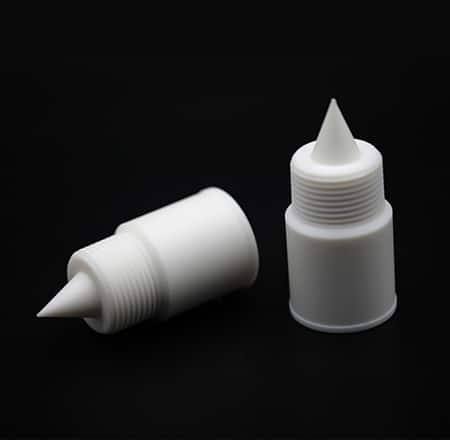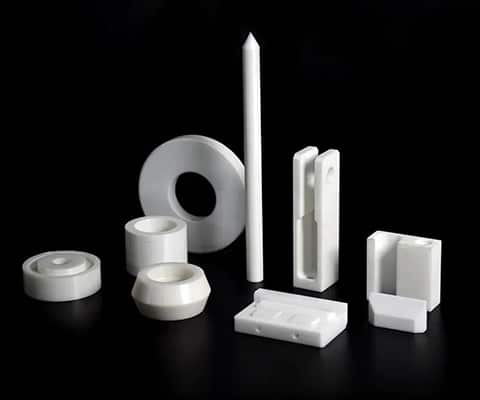CNC Machining in PTFE/Teflon
PTFE-Teflon CNC machining is widely applied for common use in different industries through the manufacturing of Teflon machined parts or components.
What Is PTFE Plastic or Teflon?

PTFE, or polytetrafluoroethylene, is a versatile engineering plastic and synthetic fluoropolymer of tetrafluoroethylene completely composed of carbon and fluorine atoms. And PTFE is usually well-known by its trade name, Teflon. Teflon is a fluorocarbon solid that has higher temperature resistance than all common engineering plastics. Depending on its fluoropolymer chemical makeup, it’s exceptional corrosion-resistant and insoluble in water or aqueous substances.
PTFE has been used in broad applications across various fields. The most notable usage of PTFE is as cooking utensils like the nonstick coating of pots. And it is often used in containers and pipes for the prevention of active and corrosive chemicals. Due to its excellent low coefficient of friction, it is an ideal material as a lubricant to help lower wear, friction, and machine energy consumption. Moreover, using Teflon as a graft material is another important application in the medical field.
CNC machining in PTFE is readily machinable thanks to its low strength, relative softness, and great thermal stability.
PTFE/Teflon CNC Machining Specification
Application
Nonstick & pipe coating, automotive lubricant, medical implants, electrical component insulation.
Tolerances
It is determined by the desired effect and the PTFE type used. A tolerance of ±0.010” (±0.25 mm) is available at Runsom.
Advantages
Hydrophobic, non-toxic, high resistant to high and low temperature and chemicals, low friction coefficient.
Wall Thickness
It is mostly decided by the available machine and part geometry. A minimum wall thickness of ±0.03” (±0.8 mm) is available at Runsom.
Lead Time
As fast as 3 days, but it will be finally determined by part complexity and order quantity.
Max Part Size
200 x 80 x 100 cm(the available size is mostly decided by the machine and part geometry).
Processes
3-axis & 5-axis CNC milling.
Finishes
As Machined, Bead Blast.
PTFE CNC Machining Manufacturer – Custom CNC Teflon Machined Parts
PTFE products are highly demanded across broad industries, particularly eagerly needed by medical and cookware applications. Runsom owns decades of experience in the production of Teflon parts employing our advanced CNC machining technologies. At Runsom, not only various PTFE materials including reprocessed PTFE, unfilled grade PTFE, bearing grade PTFE, glass-filled PTFE, and so on can you select from, but also large quantities of surface finishing options can meet your diverse demands. With a comprehensive grasp of the operation and technique of CNC PTFE machining, Runsom provides global customers with industrial-grade components such as valves, bushes, manifolds, fittings, insulators, and gears. Our PTFE CNC machining services have served an abundance of industries including electronics, construction, chemical, oil & gas, medical, and more. Ensuring every Teflon machined part is processed exactly compliant with clients’ requirements and specifications is our mission and goal consistently.

Teflon/PTFE CNC Machining Parts Applications
What set PTFE apart from most engineering plastics are its low friction coefficient, high melting point, and chemical inertness. All of those exceptional performances make it perfect for kitchen cookware and extensive use in the petrochemical, medical, electrical components, and food and beverage fields.
It is a popular material for household items like non-stick coating in cookware and more.
In computer and aerospace industries, PTFE plastic is usually used for laying wires like coaxial cables and connecting wires.
For microwave applications, CNC machined Teflon is greatly suitable for connector components at high RF and PCB insulation due to its insulation to electricity.
PTFE material is a cost-effective substitute for polyethylene depending on its high-temperature resistance.
Teflon can be found in many industrial occasions that need low friction such as sliding washers, plates, seals, bushings, bearings, etc.
It is commonly used as the lining of expansion joints, industrial pipelines, and hose assemblies as a result of its chemical inertness and high melting point.
It is a proper material in the production of glass fiber composites and carbon fiber composites.
Machined PTFE can be used as a lubricant for musical instrument products, such as valve lubricating oil.
Our Strengths in CNC PTFE/Teflon Machining Services
PTFE/Teflon FAQs
The density and softness of PTFE(polytetrafluoroethylene) make it easy to process. Compared with nylon and other materials, the strength of Teflon is low, and the tensile strength of nylon is almost two to three times that of Teflon.
Although PTFE is stable and nontoxic at a lower temperature, it begins to deteriorate at temperatures around 260°C (500°F), decomposes above 350°C (662°F), and pyrolysis at 400°C (752°F) will occur.
PTFE, short for Polytetrafluoroethylene, is an engineering thermoplastic.
The advantages of PTFE are as follows:
- Durability
- Low coefficient of friction
- Corrosive and electrical resistance
- Maintaining valid under a wide range of temperatures
The disadvantages of PTFE are as follows:
- Relatively high price
- Not easy to mass produce and be welded
- The mechanical strength will be invalid at 326°C
Applications for PTFE range from non-stick coatings for kitchen cookware to high-tech medical uses including surgical instruments, implants, and test equipment.
PTFE is highly heat resistant and resistant to friction with solids, which allows PTFE to be used as an integral part of gears, side plates, bearings, and washers. It is also used to make pipes and containers because it is corrosion-resistant and non-reactive. PTFE also has good electrical insulation properties and is used to insulate cables and connector assemblies. This makes it an ideal material for printed circuit boards, hookup wires, and coaxial cables.
